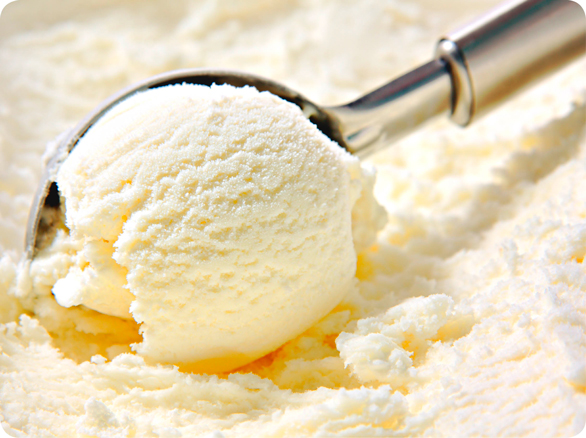Content
- 1 Ice cream production technology
- 2 Composition and calorie content of ice cream
- 3 Why ice cream is useful
- 4 Features of use
- 5 Is it possible to eat ice cream on a diet and when losing weight
- 6 The benefits of ice cream for various diseases
- 7 Ice cream for diabetes
- 8 How to make ice cream at home
- 9 How much ice cream can you eat per day
- 10 Harm of ice cream and contraindications
- 11 How to choose ice cream
- 12 Conclusion
When listing their favorite delicacies, most often both children and adults call ice cream. Indeed - this cold dessert reminds of childhood, creates a carefree mood, saturates well. You need to figure out what the benefits and harms of ice cream are in order to understand why almost everyone likes the delicacy.
Ice cream production technology
Making ice cream at the factory looks like this:
- At the first stage, the basic components - melted butter, milk, water, sugar - are mixed in an industrial bath.
- The mixture is then filtered and heated to 85 ° C. At this temperature, all microorganisms and bacteria that can cause harm die.
- Further, future ice cream is cooled in a special tank, where stirring of the mass continues.
- After a few hours, soft ice cream is divided into portions and sent to deep freeze.
- At the final stage, the product is packaged in a branded wrapper and once again sent to the refrigerator for hardening.

The technology is the same for all types of ice cream, but the details may vary. At the last stages, the delicacy can be coated with chocolate, added nut crumbs, candied fruits, pieces of berries and other components.
Composition and calorie content of ice cream
What is the nutritional value of a cold dessert, and what nutrients are included? The question cannot be answered unequivocally. There are many varieties of ice cream - it all depends on what kind of treat you buy, ice cream in a glass or popsicles, milk treat, vanilla or chocolate.
On average, 100 g of ice cream has between 100 and 270 calories. Typically, the largest share in the composition is occupied by fats - from 10 to 19 g, in second place are carbohydrates - about 20 g, and the least protein in the delicacy - up to 3.7 g.

But the vitamin and mineral composition of ice cream may surprise anyone who reads the information on the package. Usually the treat contains:
- vitamin A;
- vitamin E;
- vitamins B1 and B2;
- vitamin C;
- vitamin PP or niacinic acid;
- sodium and calcium;
- iron and potassium;
- phosphorus and magnesium;
- omega-3 fatty acids.
The share and benefits of all these elements are quite large, for example, due to one serving of ice cream, you can get 11% of the daily value of calcium and about 9% of vitamin B2.

Why ice cream is useful
The rich vitamin and mineral composition of the delicacy suggests that ice cream is not only tasty, but also very healthy. Indeed, the benefits of ice cream are as follows:
- The delicacy saturates with the necessary substances - vitamins, essential acids, sodium, calcium, potassium. This comprehensively strengthens the body.
- Ice cream promotes the production of serotonin, known as the "happiness hormone". That is why a small portion of dessert puts people in a great mood.
- Ice cream has a mild vasoconstrictor and analgesic effect. Therefore, it is recommended to eat if you have a predisposition to nosebleeds or muscle pain. The benefit of ice cream for women is that it can even relieve PMS.
- The product has a good effect on motility and intestinal microflora - it is of great benefit for both constipation and diarrhea, improving the functioning of the stomach.
- Some doctors recommend eating ice cream more often for those who constantly suffer from colds. The benefit of a cold dessert is that it hardens a sore throat.

Ice cream is a sweet product, but it also contains a lot of ordinary water, so the benefits of ice cream also lie in effectively quenching your thirst.
Features of use
The benefits and harms of ice cream depend on the observance of important rules. These include:
- Eating dessert or drinking a milkshake with ice cream is best in the morning or afternoon. In the evening, the body will not have time to assimilate fats and carbohydrates.
- While hot weather is the best time for ice cream, you need to be careful about eating it. Do not swallow large pieces at once - this can lead to sore throat.
- Ice cream suppresses hunger, but cannot replace normal food. Even in summer, you should not eat exclusively with this delicacy, otherwise the body will be harmed.

During pregnancy
Fortunately, ice cream doesn't make it to the pregnancy ban list. Its benefits far outweigh the harm.
Advantages:
- Ice cream improves a woman's mood by helping her cope with hormonal changes.
- The treat increases resistance to heat, which means that it is easier to endure the state of pregnancy.
- Regular use of the product saves from insomnia, as it has a beneficial effect on the nervous system.
However, a number of conditions must be met:
- It is not recommended to eat more than 100 g of a treat per day.
- It is better to choose white ice cream made from whole milk in the store. You can study the recipe for milk ice cream for making at home and independently control the benefits and harms in its composition.
- You can not eat ice cream with weak kidneys, hypertension and high blood sugar - this is dangerous for both the woman and the fetus.

Ice cream for children: is it possible and at what age
Giving a treat to children is not only possible, but also necessary. Parents often think that the benefits and harms of ice cream are about the same, but in fact, the positive properties outweigh - the product strengthens the child's body.
Babies under 2 years old should not be offered a treat. But upon reaching this age, a couple of spoons of ice cream will be of continuous benefit. For a start, it is better to melt the delicacy so that it turns from ice to cool.

Is ice cream allowed for breastfeeding
Breastfeeding mothers can eat ice cream, but not earlier than 4 months after giving birth. Ice cream increases the fat content of breast milk, which can lead to baby colic.
Natural white ice cream remains preferable - its benefits for a nursing mother are maximum.
Is it possible to eat ice cream on a diet and when losing weight
Those who are prone to weight gain often have to go on a diet. The question arises - is it necessary to give up ice cream, or will it be beneficial even while losing weight?
You can eat dessert if you follow a number of rules:
- choose only the most low-fat and low-calorie product, and even better - learn how to make ice cream at home;
- do not exceed 80 g servings per day;
- actively move so that calories do not go to harm;
- do not eat dessert after 4 pm.

The benefits of ice cream for various diseases
Surprisingly, the benefits and harms of ice cream remain balanced, even if there is a treat for ailments. It contributes to:
- reducing pain;
- removal of puffiness - for example, after sunburn;
- reducing sore throat - of course, with careful use, without swallowing large pieces;
- lowering the temperature - and here there are more benefits, and less harm than many pharmacological agents.

Ice cream for diabetes
Ice cream does not harm diabetics, but there are strict rules for its use. The following recommendations should be adhered to:
- You need to choose varieties with a low fat and carbohydrate content. The safest, from this point of view, delicacy is ice cream with a fructose base. And the greatest harm is fraught with a popsicle with chocolate icing.
- For diabetics, it is better to combine ice cream with physical activity before or after dessert.
- You need to limit yourself to a maximum of 80 g of delicacies per day, and it is better to indulge yourself with ice cream only 2-3 times a week.
- It is necessary to closely monitor the sugar level and measure it after ice cream - for comparison with usual indicators. If the level changes for the worse, it is better to refuse the product.

How to make ice cream at home
The factory technology for the production of delicacies seems complicated, but you can cook it at home - according to a similar scheme. For example, to make homemade milk ice cream, you need:
- stir milk (1 l) in a large saucepan and put on the fire, add fine butter, chopped into pieces (100 g);
- while the ingredients are boiling, mix 2 cups of sugar with five egg yolks and 1 teaspoon of starch, dilute with a small amount of milk and beat until smooth;
- pour the resulting liquid mixture into boiling milk and butter, mix and wait for a new boil;
- after that, remove the pan from the stove and put it in cold water, while constantly stirring the mixture.
When the future delicacy has completely cooled down, it remains to give it shape. Then homemade ice cream is put into the freezer for several hours until it solidifies.

Homemade ice cream without cream, milk-based, delicious in itself. But you can add other ingredients if desired.
To prepare a treat with a chocolate or coffee color and taste, you will need:
- brew 250 ml of cocoa or coffee, mix with 700 ml of milk and boil over a fire;
- thoroughly mix six egg yolks with 100 g of powdered sugar, carefully add to the milk-coffee mixture;
- boil again, and then cool in cold water, stirring constantly.
Then, as in the previous recipe, it remains to shape the finished delicacy and send it to freeze.

How much ice cream can you eat per day
The benefits of the product are great, but you still need to limit its use. Even healthy adults are advised to eat no more than 100 g of the product per day. And it is better to limit yourself altogether to 2 - 3 servings per week, so that the increased calorie content does not exactly affect either the figure or the level of cholesterol and sugar.
Harm of ice cream and contraindications
The benefits and harms of ice cream are closely related. What are the negative consequences of consuming a treat?
These include:
- The main harm of ice cream is the high content of sugar and fat in the product - the dessert contributes to weight gain.
- With weak vessels, a delicacy can provoke their sharp narrowing - and, as a result, a headache.
- People with a predisposition to heart attacks and atherosclerosis need to eat dessert very carefully - the benefits and harms in this case are difficult to predict.
- Not all types of delicacies consist only of natural ingredients - often chemical additives can be found in the composition, as well as palm oil.

Contraindications are divided into absolute and relative, they include:
- A natural milk treat can be harmful to people with lactose intolerance.
- Diabetes is a relative contraindication for ice cream - you can use the product, but in small quantities.
- Overweight people also need to limit themselves - for example, it is advisable to exclude ice cream ice cream, and it is better to replace it with popsicles.
How to choose ice cream
The choice of this dessert does not only depend on personal preference. The following recommendations are offered:
- The benefits and harms of ice cream depend on its freshness. It is better to buy a delicacy made recently - so there is less risk that it has already thawed and frozen several times in the store.
- The fewer extraneous additives in the delicacy, the higher the benefits. It is worth giving preference to a product without flavor enhancers, flavors and preservatives.
- The best ice cream is still the one that meets the GOST standards - state-level quality standards.

Conclusion
The benefits and harms of ice cream complement each other - if consumed excessively, all the good properties of the product can be harmful to health. But if you feast on them in moderation, it will only bring pleasure. Delicious and natural ice cream has a refreshing effect on both physical and emotional health.

